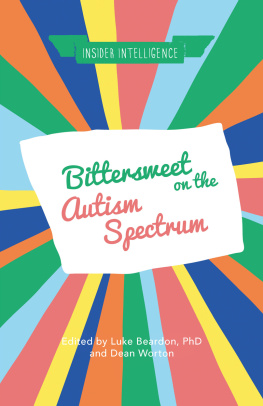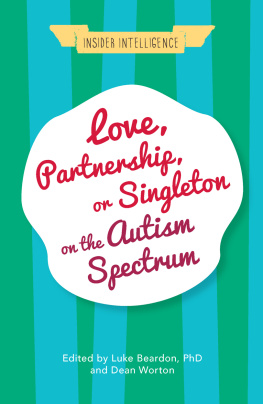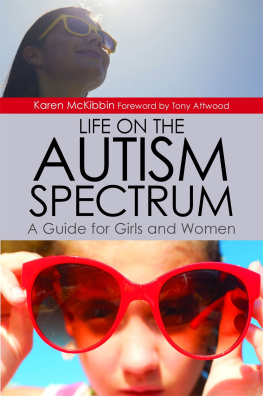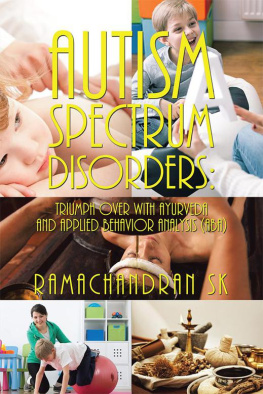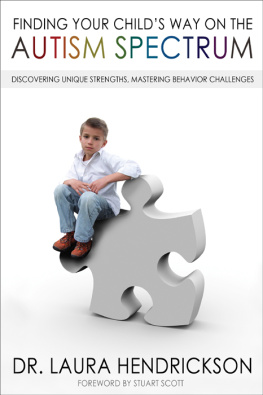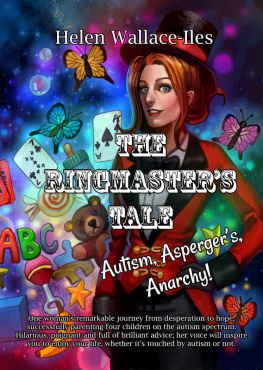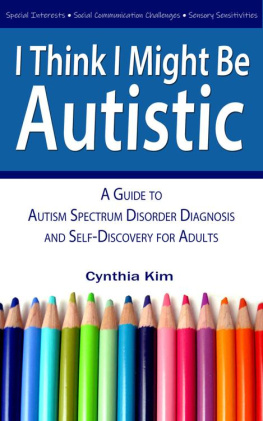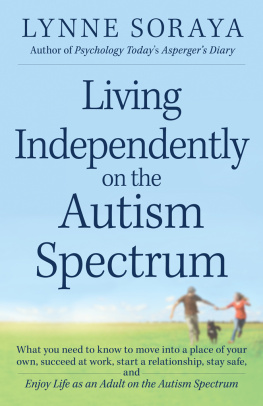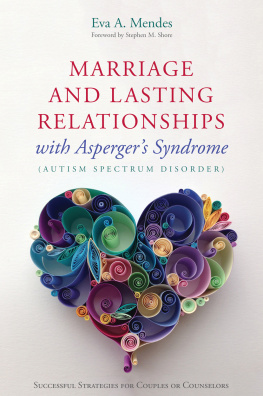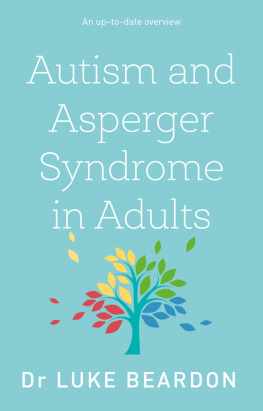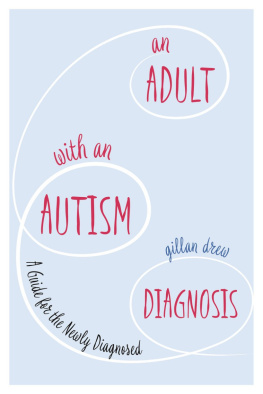
Bittersweet
on the
Autism
Spectrum
Edited by Luke Beardon, PhD
and Dean Worton

Jessica Kingsley Publishers
London and Philadelphia
CONTENTS
PREFACE
Luke Beardon
It is with the greatest of pleasure that I am able to introduce a book on positive experiences as articulated by adults on the autism spectrum. Autism means so many different things to so many different people rightly so, as of course all autistic people are individuals in their own right, with their own unique sets of experiences and ways of understanding the world around them. Having noted that, it is not at all uncommon to find autism within outlets such as the media being used alongside rather pejorative terms, which, however subtly, can create a sense of negativity associated with autism. Whilst it is absolutely the case that some people are impacted negatively for whatever the reason, it is equally clear that this is not a global experience and, for some, being autistic is not all doom and gloom. One of my ex-doctoral students, for example, becomes incensed when she is described as suffering with autism; as she so brilliantly states, I am blessed to be different. Without autism the world might be quite dreary.
When I have written about the positive side of autism publicly in the past, the feedback has been very clearly divided: the majority of people (almost exclusively people with autism) are grateful that a positive side of being autistic is being explored, but a minority has noted that in their experience there is nothing positive about autism at all. I am fully aware that autism is expressed in a plethora of ways, and presentations can be wildly different. In this book Dean and I have very deliberately chosen to provide a platform upon which individuals themselves can express what positive experiences they have had as an autistic person. There are many other books that directly target problems associated with autism; this one, rightly or wrongly, has chosen a different path, one that we feel is not just valid but also illuminating.
We didnt really know what to expect when we embarked on this book. Probably a good thing in many ways autism is a rather unpredictable field! However, we were extremely pleased when we started to get sample chapters sent in and realised the richness and diversity of experiences that people were writing about. I wont pick and choose chapters for individual praise they are all a very worthy read. What is so illuminating to me is that some of the subject areas that individuals have related as positive could never have been predicted in the proverbial million years.
Without a clear evidence base its impossible to know what the general perspective on autism is within society; however, I would be willing to bet that autism and positive experiences are not usually paired up together at the forefront of peoples minds. Just because one is autistic it does not automatically mean that positive experiences are preclusive. This book demonstrates that individuals can, and do, experience life in positive ways, sometimes in the face of adversity.
I do not subscribe to the notion that one must have a problem before one is identified as being autistic. To me, this makes little (or no) sense. Being autistic does not necessarily mean that one has a problem. Very often, being autistic means that life may be harder in many ways but lots of people face all sorts of problems, autistic or otherwise. Diagnostic criteria tend to suggest that people with autism are somehow lacking i.e. that they are impaired in some way. This very medical deficit based model can be hugely offensive to some autistic people. There are some who would sooner suggest that the only deficit is in lacking a similar cognitive profile to the predominant neurotype and, further, who might suggest that this is in itself not a deficit at all. Being a minority group will often mean that there are challenges to face that are less common within the majority population; it does not automatically mean that being in that minority group means that one is inferior in some way.
In a sense, this book is about celebrating the positive experiences of people with autism. It is not trying to suggest that all autistic people will share positive experiences, or even to infer that there are any particular themes or trends in what people with autism experience as positive. Just reading through the chapters gives a very clear message that what is positive to one person may not fall into that category for another. However, reading the chapters does give a very strong message that some autistic individuals can experience life in a positive way, and there are elements of passion, humour and intensity of emotion that make this book such a rewarding read.
I would like to thank the authors for putting their time and energy into submitting their chapters, and Dean for all his invaluable input.
Beale-Ellis, S. (2015) Autism and Martial Arts: A Guide for Children, Parents and Teachers . Herne Bay: NAKMAS Publishing, p.4.
Chapter 1
Opening the Umbrella
(Multicoloured Thank You Very Much!)
Alyssa Aleksanian
Introduction by Luke Beardon
The following is such a powerful quotation it seems appropriate to start with it:
The privilege of being oneself is a gift many take for granted, but for someone with AS, being allowed to be oneself is the greatest and rarest gift of all.
Alyssa is a gifted writer and the quotation above illustrates how superb she is at articulating her thoughts. The chapter as a whole is stimulating and insightful.
I think that one of the key messages, so brilliantly delivered in the chapter, is that so much can be gained by first allowing an individual to identify with themselves; second, for those around them to understand the individual and accept them for who they truly are as opposed to who they may historically have tried to be. So many adults that I have the privilege of speaking to tell me of the relief of getting an identification and subsequently feeling empowered to stop emulating others, or trying to be what others want them to be (i.e. more in line with the general population). I dont think its a case of just letting people with autism/Aspergers syndrome (AS) behave in any way they want, which is a criticism I have heard in the past, and nor do I think that this is a sentiment that people with autism/AS see as appropriate either; however, what is clear to me is that allowing an individual to understand themselves and develop the confidence to engage with the world and be accepted as a person with autism/AS is critical. Perhaps, one day, this will be more common than the rarest gift of all.
Diagnosis as an adult
Early in life I recognised the different tune humming through me, out of synch with other children my own age. Not with nature, not with the rhythms of the planet; those songs I understood. But with the world the peopled world those harmonies were a constant clash.
It has often been said that many people with AS identify with the unpeopled world, whether it be nature, machines or the arts. Take the unpredictability of humanity out of our lifes equation and our AS anxiety drops to a mere murmur.
For years, all those quirks (which on a bad day I called my random defects and on a good day I called just being me) I kept tightly under wraps. I had learnt early on that to say certain things got me stared at, stony silence or edged out of a conversation. I thought that when I reached that magical and elusive age called adulthood, all would fall into place and Id finally hit my stride, somehow catch up to everyone else and work out what they were all on about. I would gesture, laugh and participate with ease just like I saw others do. However, no elusive age arrived and the eventual catalyst for appreciating my own rhythm came in a very different guise: a diagnosis of Aspergers, well into my thirties.
Next page
